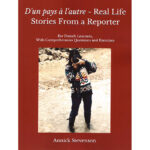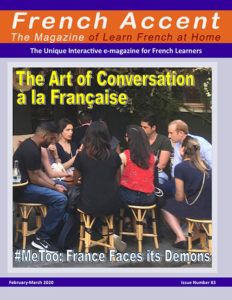To help you to find the best way to learn French and to speak like a French person, we are continuing our series of lists of expressions (published in French Accent Magazine) that one should and should not say if one wants to speak like a French person and be understood immediately by the French.
Many of the typical mistakes made by non-native speakers are the result of translating everyday English expressions directly and literally into French. It doesn’t always work, and these common errors are what differentiate a native French speaker from a foreign French speaker. Like last time, we have carefully chosen the expressions we hear most often and that will make a difference to a French native’s ear.
1) Too much… Too many…
The French love to share a good meal and good wine, but at times you might have to stop them from giving you too much and this is where this four-letter word comes in handy: trop
As a teacher, I often hear c’est très beaucoup which really means “it’s very a lot” or I might hear c’est trop beaucoup – neither works in French, as you cannot follow trop with beaucoup.
Don’t say: C’est trop beaucoup !
Say: C’est trop !
Examples:
J’ai trop mangé ! = I ate too much!
Il y a trop d’étudiants dans cette classe = There are too many students in this class.
2) I’m full!
Again, you’ve eaten trop and you wish to communicate politely that you’re full -what will you say? You cannot literally translate it as je suis plein – it just doesn’t work. The only time we hear that a living being is plein, is when used for an animal which is pregnant! For example, you could hear ma chienne est pleine which means that “my dog is pregnant”.
This is what French people will say:
J’ai bien mangé, merci ; je n’ai plus faim = I ate a lot, thank you; I’m not hungry anymore.
Or at times you will hear je n’en peux plus which means = I can’t eat anymore of it.
The more elegant choice is the first one, indicating that you ate well shows that you’re very satisfied.
Don’t say: Je suis plein(e).
Say: J’ai bien mangé, merci, je n’ai plus faim !
3) Can you help/assist me…?
I would like to clarify the use of the 2 verbs: assister and aider. The English may use the verb “to assist” when wanting to help someone but in French the verb assister really means to attend something like a meeting, a conference…
Therefore, in French you should only use the verb aider in this situation.
Don’t say: Est-ce que vous pouvez m’assister ?
Say: Est-ce que vous pouvez m’aider ?
Examples:
Excusez-moi Monsieur, pouvez-vous m’aider à remplir ce formulaire ? = Excuse me, Sir, could you help me fill out this form?
Oui, bien sûr, je serais heureux de vous aider = Yes, of course, I would be happy to help you.
Again, assister would be used in a completely different context such as: Voulez-vous assister à la réunion d’information ? = would you like to attend the information session?
4) That’s right!
This is a difficult one as you have quite a few choices. I do hear at times c’est d’accord from our students and such an expression just may leave your French friends scratching their heads.
Here are a few different ways to express “that’s right” depending on the circumstances:
1. If you agree with someone about something, you can say:
C’est ça ! Exactement !
C’est vrai !
Examples:
Je trouve qu’il y a trop de chefs dans cette cuisine ! = I think there are too many cooks in this kitchen!
Exactement, il y en a trop ! = That’s right, there are too many of them!
Or you could hear:
C’est ça, il y en a trop !
C’est vrai, il y en a trop !
2. If you reply to someone’s question positively, you have a few choices:
C’est juste ! En effet ! C’est correct !
Examples:
Avez-vous vérifié le calcul ? = Have you checked the calculation?
Oui, il est juste ! = Yes, it is right! Note: You can also say: Oui, il est correct !
Allez-vous au cinéma ce soir ? = Are you going to the movies this evening?
Oui, en effet ! = Yes, that’s right! (it can also be translated as “Yes, indeed!”).
Don’t say: C’est d’accord.
Say: Depending on the context: C’est vrai !
C’est ça ! Exactement ! C’est juste ! C’est correct ! En effet !





 Improve your French aural comprehension, your French writing skills or your grammar knowledge. Communicate with ease and confidence when traveling in France… Our ebooks have helped thousand of French learners. Ebooks with audio, exercices, short stories, etc.
Improve your French aural comprehension, your French writing skills or your grammar knowledge. Communicate with ease and confidence when traveling in France… Our ebooks have helped thousand of French learners. Ebooks with audio, exercices, short stories, etc.
 Receive our French Learning e-Magazine for FREE!
Receive our French Learning e-Magazine for FREE!